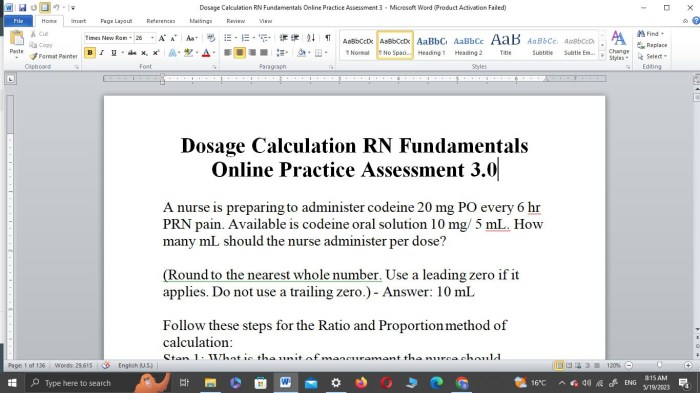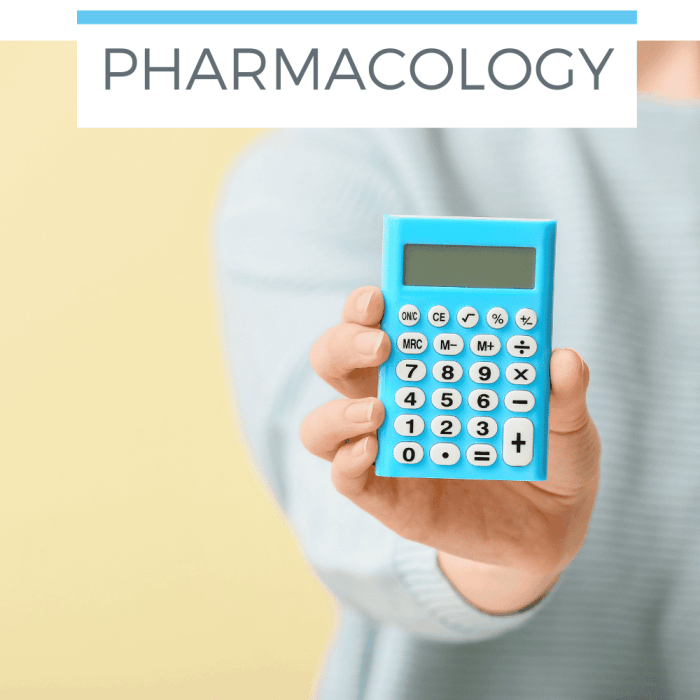The ATI Pediatric Dosage Calculation Proctored Exam plays a pivotal role in ensuring accurate medication administration in pediatric patients. This comprehensive guide delves into the intricacies of pediatric dosage calculations, the format and content of the ATI exam, and strategies for success.
Understanding the principles of pediatric dosage calculations is paramount to ensure the safety and well-being of young patients. The exam assesses candidates’ ability to apply these principles in a standardized and proctored environment, providing a benchmark for competency in this critical aspect of nursing practice.
Pediatric Dosage Calculation
Accurate pediatric dosage calculations are crucial for ensuring the safety and efficacy of medications in children. Various methods are used for pediatric dosage calculations, including weight-based, surface area-based, and age-based calculations.
Weight-based Calculations
Weight-based calculations are the most common method for calculating pediatric dosages. The dose is typically determined by the child’s weight in kilograms (kg).
- Dose (mg) = Weight (kg) x Dose per kg
- Example: A 10 kg child is prescribed a medication with a dose of 5 mg/kg. The dose for this child would be 10 kg x 5 mg/kg = 50 mg.
Surface Area-based Calculations
Surface area-based calculations are used when the child’s weight is not known or when the medication is highly protein-bound. The dose is determined by the child’s body surface area (BSA), which can be estimated using the following formula:
- BSA (m2) = 0.007184 x Height (cm)0.725 x Weight (kg)0.425
Age-based Calculations
Age-based calculations are sometimes used for medications that have a narrow therapeutic index. The dose is determined by the child’s age in years or months.
ATI Proctored Exam: Ati Pediatric Dosage Calculation Proctored Exam

The ATI proctored exam is a standardized exam that assesses nurses’ knowledge and skills in pediatric nursing. The exam consists of multiple-choice questions that cover a variety of topics, including pediatric dosage calculations.
Format and Content
The ATI proctored exam is a computer-based exam that is administered in a proctored environment. The exam consists of 150 multiple-choice questions that are divided into four sections:
- Pediatric Assessment
- Pediatric Nursing Interventions
- Pediatric Medications
- Pediatric Emergencies
Key Areas Tested, Ati pediatric dosage calculation proctored exam
The ATI proctored exam tests nurses’ knowledge of a variety of pediatric nursing topics, including:
- Pediatric growth and development
- Pediatric assessment techniques
- Pediatric nursing interventions
- Pediatric medications
- Pediatric emergencies
ATI Pediatric Dosage Calculation Proctored Exam
The ATI pediatric dosage calculation proctored exam is a specialized exam that assesses nurses’ knowledge and skills in calculating pediatric medication dosages. The exam consists of multiple-choice questions that cover a variety of pediatric dosage calculation methods.
Specific Requirements
The ATI pediatric dosage calculation proctored exam has specific requirements that must be met in order to take the exam. These requirements include:
- Current RN license
- Completion of an ATI pediatric nursing course
- Registration for the ATI proctored exam
Exam Process
The ATI pediatric dosage calculation proctored exam is a computer-based exam that is administered in a proctored environment. The exam consists of 50 multiple-choice questions that must be completed within 90 minutes.
Types of Questions
The ATI pediatric dosage calculation proctored exam includes a variety of question types, including:
- Multiple-choice questions
- Fill-in-the-blank questions
- Case study questions
Resources for Preparation
There are a variety of resources available to help nurses prepare for the ATI pediatric dosage calculation proctored exam. These resources include:
- ATI Pediatric Dosage Calculation Study Guide
- ATI Pediatric Nursing Online Course
- Pediatric Dosage Calculation Practice Tests
Study Groups and Workshops
Joining a study group or attending a workshop can be a helpful way to prepare for the ATI pediatric dosage calculation proctored exam. Study groups and workshops provide an opportunity to review the material with other nurses and to ask questions.
Personalized Study Plan
Creating a personalized study plan can help nurses focus their studies and make the most of their time. A study plan should include a schedule of study sessions, a list of topics to review, and a list of practice questions to complete.
Exam Day Strategies

There are a number of strategies that nurses can use to manage their time effectively and perform well on the ATI pediatric dosage calculation proctored exam. These strategies include:
- Arrive at the testing center early
- Read the instructions carefully
- Manage your time wisely
- Review your answers
Dealing with Stress and Anxiety
It is normal to feel some stress and anxiety before taking the ATI pediatric dosage calculation proctored exam. However, there are a number of things that nurses can do to manage their stress and anxiety, including:
- Practice relaxation techniques
- Get a good night’s sleep
- Eat a healthy breakfast
- Talk to a friend or family member
Popular Questions
What is the significance of the ATI Pediatric Dosage Calculation Proctored Exam?
The exam evaluates nurses’ ability to accurately calculate pediatric dosages, ensuring safe and effective medication administration in young patients.
What are the key areas tested on the exam?
The exam covers the principles of pediatric dosage calculations, including weight-based dosing, body surface area dosing, and medication compatibility.
How can I prepare effectively for the exam?
Utilize recommended textbooks, online resources, study groups, and workshops to enhance your understanding of pediatric dosage calculations.
What strategies should I employ during the exam?
Manage time effectively, carefully review questions, and remain calm to maximize your performance on the exam.